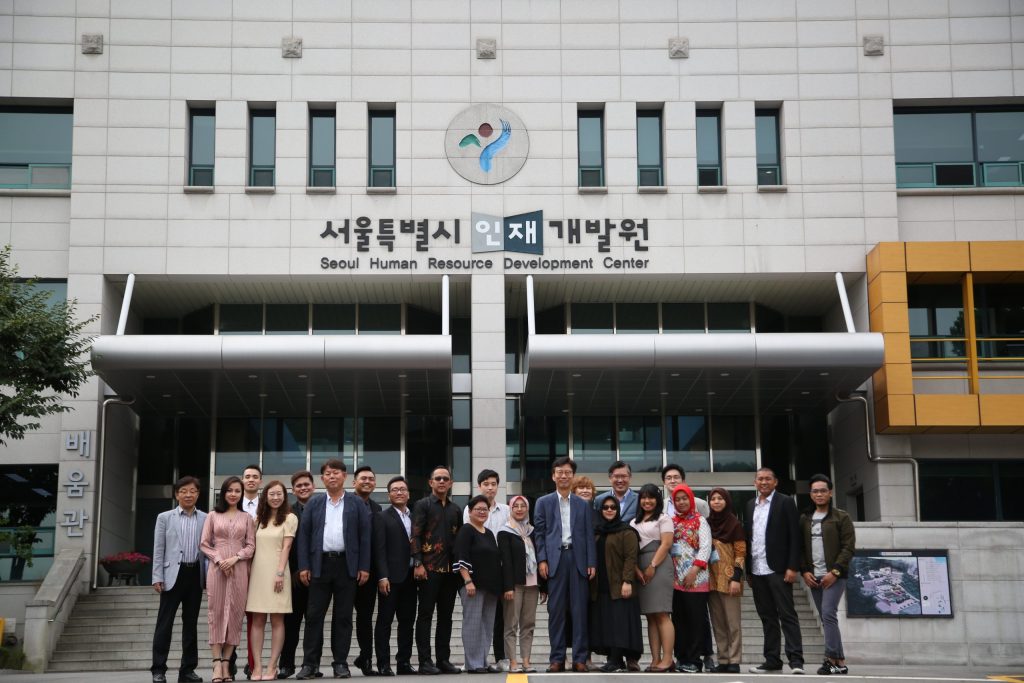ACP Cities updated with Seoul’s latest strategy on climate change and air pollution control

Since the importance of low carbon and sustainable development in cities has been highlighted in the UN Sustainable Development Goals (SDGs) 11, the role of local governments in addressing climate change has grown significantly in the last few years. Meanwhile, citizens in most Asian cities are confronting both climate change and air quality challenges in their daily lives.
To support Asian cities developing their own capacity in combating climate change and air pollution, ICLEI East Asia and the Seoul Human Resources Development Center (SHRDC) have been providing annual capacity building to local governments in the Asia Region since 2016. Recently in September, a week-long training was provided to local government officials from Indonesia, the Philippines, and Vietnam.
This year, the training was especially meaningful as it was part of the Ambitious City Promises (ACP), a program led by ICLEI to develop the capacity of local governments in the cities of the above-mentioned countries from 2017-2020. This project aims to support these cities to establish their own, customized climate policy and action plans, and ultimately reduce greenhouse gases to contribute to the global goals. Seoul has been playing a crucial role as these cities in the Southeast Asia region specifically decided to adopt the Promise of Seoul, the key strategy on climate change of the South Korean capital.
As a part of the program, SHRDC and ICLEI East Asia invited 11 officials from Jakarta, Bekasi (Indonesia), Paranaque, Pasig (the Philippines), and Hanoi (Vietnam) to the training, which included experience-sharing, policy briefings, as well as site visits to several key low-carbon and sustainable city projects in Seoul.
On this occasion, the climate, transportation, waste management, and citizen participation division heads of the Seoul Metropolitan Government shared their knowledge and expertise in implementing their respective policies and best cases. Field trips to places including the Nanjido Museum, hydro station, the Seoul Upcycling Plaza, and a community-led self-energy sufficient village were also arranged for the participants to experience how each policy is being implemented and perceived on the ground.
The participants were deeply impressed by Seoul’s achievements and motivated by the engagement of every stakeholder at multi-levels; nevertheless, there were also concerns that the local contexts in Seoul and their home cities could be rather different. For instance, utilities and infrastructure, such as electricity, transportation, and water treatment, in the Philippines are owned by private entities, making it difficult for cities—let alone the central government—to collect data and/or carry out public projects in these fields.
Another challenge the participating cities are facing was the lack of knowledge, finance, and support from central governments. Located on the eastern border of Jakarta, the Indonesian city Bekasi serves as a commuter city within the Jakarta metropolitan area. Yet, as a relatively small city compared to the country’s capital, Bekasi has been managing all the waste generated from Jakarta without sufficient support from the central government. The problem has been exacerbating in recent years, as the existing landfill site in Bekasi may be filled up in 3 years, but without sufficient knowledge, the city officials have yet to come up with solutions.
A lack of citizen participation is also a common obstacle the cities have identified. Representatives of Pasig, for example, were particularly fascinated by the presentation made by Yeonji Kim from the Citizen Participatory Energy Policy Division of Seoul, and have expressed their intention to introduce an incentive program similar to the voluntary energy-saving program EcoMileage of Seoul. Hanoi, on the other hand, was intrigued by the public transportation system and the transfer-free scheme in Seoul, along with their environmental benefits including air-quality improvement.
Last but not least, the lack of financial support, is yet another big hurdle. While the city officials have enhanced their capacities in climate-related policy planning and implementation, and have demonstrated their willingness and passion to make their cities better, they have also expressed that, with limited financial means, it has not been easy for them to realize their ambitions. It was, therefore, suggested that an additional session on financial instruments in future training could be helpful for local governments in the region to develop and accelerate their climate policies in more economically efficient and realistic ways.
ICLE East Asia will continue to work with SHRDC in providing capacity-building opportunities to vulnerable local governments in the region, with the aims of increasing the awareness of climate change among city leaders and widening their networks to co-create solutions for common challenges in the field.

